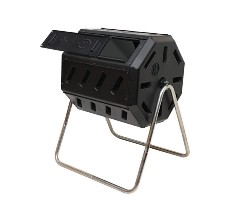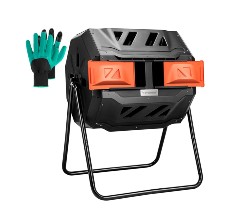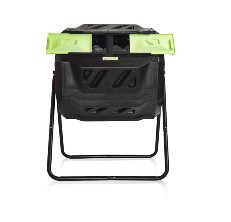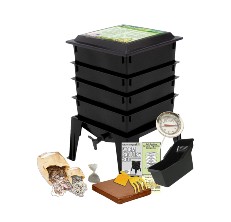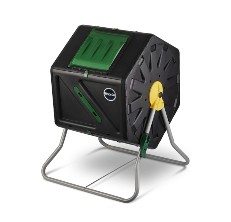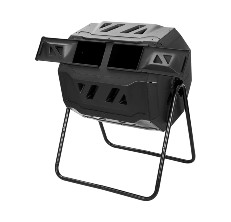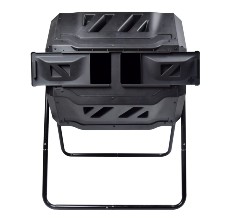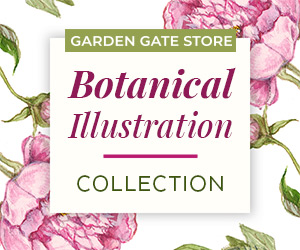Composting is a natural process that transforms organic waste into nutrient-rich soil conditioner, making it an essential practice for sustainable gardening and reducing waste. Composting not only diverts organic materials from landfills but also helps improve soil structure, retain moisture, and suppress plant diseases. In this article, we'll delve into the world of composters, exploring their benefits, the different types available, and key considerations for successful composting. We'll also provide insights on the composters selected, with FCMP Outdoor standing out as the best composter for your gardening needs. Whether you're a seasoned gardener looking to enhance your composting setup or a beginner eager to learn, join us as we uncover everything you need to know to start composting like a pro.
Our Top Picks For Composter
The Best Composter: A Buying Guide
Composting is a great way to turn your food waste into nutrient-rich fertilizer. Before buying your next or first composter, there are a few vital things you should consider. In this guide, we will explore all you need to know and more.
Types of Composters
Compost bin
This ranks as one of the most basic types out there, and they have a close semblance to trash bins; they are not meant to remain in one spot. Usually, this composter comes with a large capacity and a removable lid that helps protect your compost from interested animals and the elements. Note that this type of compost takes more time to break down the food waste when compared with other options, and you may have to mix the compost manually.
Compost tumbler
Compost tumblers are made to simplify turning food scraps and compost on the go and mixing it with greater frequency to speed up breaking it down. Most compost tumblers are off the ground, which makes them animal-proof. Also, they are pretty easy to empty into a container whenever the compost is ready.
Worm composter
The most significant advantage of using the worm composter is that it can be used indoors. With worm bins, you can keep worms living inside your compost bin, where they will be able to eat all the trash from your food waste and convert it to much-needed compost. Worm bins easily rank as the fastest option out there, and the worms will quickly eat the kitchen trash and yard waste, such as grass clippings, before it begins to stink.
Things to Consider Before Buying a Composter
Because there are different types of composters out there, getting the right one can be challenging. Compost containers should contain the right mix of nitrogen and carbon materials, aeration, and moisture, all mixed during this process. Keep reading to find out what else you need to consider before you buy a composter!
Size
The size of the container ranks as one of the top limiting factors as far as the ability to produce compost quickly is concerned. If the compost holds less than a cubic yard of materials, it can still serve a purpose. However, you need to properly manage the air, contents, moisture, and temperature if you want the compost to be quickly produced. However, if you don’t mind sparing a lot of time, container size shouldn’t be a top priority for you.
Weight
If the compost is in a tumbler, you will want something you can easily rotate when it contains wet and heavy organic matter. If you are not going for a tumbler and only have a single container, you ought to lift and manipulate both container and content easily.
Ease of use
There are a couple of factors that influence the ease of use. One of the factors bothers on how often you have to mix the compost quite easily. Without a doubt, worm composters rank among the easiest of them because you don’t have to do anything to mix your compost.
One other factor you need to consider is to get the perfect mix of carbon and nitrogen. This matters a lot, especially if you want to speed up the process. One significant advantage of worm composters compared with other composters is that you don’t need to be scared about any inherent risks or challenges.
Also, you need to factor in the level of difficulty required to empty the composter when you need access to the finished product.
Ease of assemblage
Although this only appears like an issue once, it can play a huge role in determining how satisfied you will be with your composter after you buy it. The easiest way to ascertain how easy it is to assemble would be to check for relevant reviews before purchasing the composter. If you intend to make the composter yourself, you should avoid buying composters with a reputation of being difficult to assemble.
Cost
There is something for everyone regardless of budget when it comes to composters. If you would instead go the way of DIY, you should be able to get something cheap. However, if you are looking for a proper composter, you should be willing to part with at least $50 for the affordable compost bins and $300 for the premium quality composters.
Typically, most composters fall within a price range of $80 and $150. With a budget within this range, you should be able to get something decent.
Pest deterrents
When buying the composter, ensure that the lids are secured tightly to shield you against strong winds and pests. Also, you should be able to lift the caps to add extra organic matter and food scraps without stress. You will also find some units that offer the user sliding trap doors at the base to access the processed compost so you can easily deposit your food waste inside.
Conclusion
Compost ranks as one of the easiest ways you can cut down on food waste while making your plants happier. Knowing the right composter for your home is a profitable investment, especially if you want a cleaner and greener environment. In this guide and review, we’ve gone over the best composters of 2023, and all you need to do is make the perfect choices from the list.
If you’re totally new to the process of composting, you may want to watch this video from Growit Buildit that goes over all the information beginners need to know:
People Also Asked
What can I do to speed up the composting process?
The best thing to do in that regard will be to follow the guide that comes with the composter. Also, ensure that the materials are moist but not soggy so as to make them optimally compostable.
Do I have to cover my compost?
During the winter season, it is wise to cover the compost to prevent it from getting waterlogged. In summer, covering the pile ensures that the moisture is retained.
Where is the best place to put my compost system?
Ideally, you should place your compost system shaded from the sun so that it doesn't get dried out. It would help if you set ground-based compost bins and piles on bare soil so that beneficial organisms can access them.




